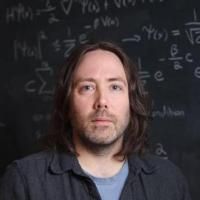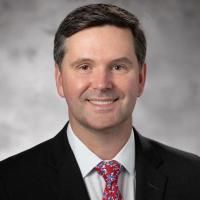Alfred Paul Sanfilippo, MD, PhD earned his BS and MS degrees in physics from the University of Pennsylvania, and his MD and PhD in immunology as a Medical Scientist Training Program Fellow at Duke University. He did his residency training in Pathology at Duke University Hospital, receiving Board certification in Anatomic and Clinical Pathology, and Immunopathology. Dr. Sanfilippo was on the Duke University faculty from 1979-1993, rising to Professor of Pathology, Surgery, and Immunology. At Duke he also served as Director of the Duke-VAMC Immunogenetics-Transplantation Laboratory, Director of the Duke Immunopathology Lab, and Chief of the Renal and Transplant Pathology services.
David C. Sabiston Jr. Professor of Surgery
GIVEN BY FRIENDS OF DAVID C. SABISTON JR.
David C. Sabiston Jr., MD, was a James B. Duke Professor of Surgery and chair of the Department of Surgery. He attended the University of North Carolina at Chapel Hill and Johns Hopkins University School of Medicine. After serving in the U.S. Army at Walter Reed Army Research Center, Sabiston returned to Johns Hopkins as a Howard Hughes Medical Institute Investigator, attaining the rank of professor before being recruited to Duke. He brought international prominence to Duke’s surgery department and became legendary as a tough but beloved mentor. When he retired, former Duke surgical residents, surgery faculty members, and friends established this professorship in his honor.
Herbert A. Saltzman Pulmonary Research Professor
GIVEN BY HERBERT A. SALTZMAN
Dr. Herbert Aaron Saltzman spent most of his career at Duke University Medical Center and was the founding father of the Duke Center for Hyperbaric Medicine. He was first a scientist, elected to the American Society for Clinical Investigation in 1971, and later a consummate clinician, leading the NIH Prospective Investigation of Pulmonary Embolism Diagnosis study from 1983 to 1987. He retired from Duke in 2000 at age 70 after more than 40 years of service. He then joined the Danville Pulmonary Clinic where he worked closely with his former student and close friend, Thomas O'Neill. Dr. Saltzman, who died in 2018 at age 90, is remembered as an inspirational role model.
The Herbert A. Saltzman Pulmonary Research Professorship is vacant. The School of Medicine looks forward to filling this professorship in the near future.
Thaddeus V. Samulski Assistant Professor of Radiation Oncology
GIVEN BY THE R.J. SAMULSKI INNOVATION FOUNDATION
Thaddeus V. Samulski, PhD, was Professor of Radiation Oncology at Duke University and an expert in the field of hyperthermia for cancer treatment. Recruited to Duke in 1986, he quickly became a leader in the Department’s cutting-edge hyperthermia program and remained at Duke for the entirety of his career, where he received the J. Eugene Robinson Award for Excellence in Hyperthermia Research in 1999. Additionally, Dr. Samulski served as head of the physics division within Radiation Oncology and had special pride in the establishment of the first medical physics training program and his subsequent mentorship of trainees. Among his many accomplishments was the development of magnetic resonance imaging for noninvasive temperature measurement in real time in patients undergoing hyperthermia treatments. This required substantial modification of a commercial MRI unit carried out in collaboration with GE Healthcare. This seminal work holds the promise for the development of full three-dimensional temperature mapping in human patients in real time while undergoing hyperthermia treatments. Dr. Samulski died in 2009.
James H. Semans, MD, Professor of Surgery
GIVEN BY JAMES H. SEMANS AND THE MARY DUKE BIDDLE FOUNDATION
James H. Semans, MD, was a Duke surgeon and urologist, and a pioneer in rehabilitative and urinary surgery. He and his wife, Mary Duke Biddle Trent Semans, were involved in numerous charitable causes. James Seman served for 48 years on the Mary Duke Biddle Foundation, a trust established in 1956 to support education, religion, music, and the arts. At Duke, James and Mary Semans were instrumental in establishing the Health Arts Network and the Nasher Museum of Art. This endowment supports a faculty member in the field of urologic surgery.
Dorothy J. Shaad/Angus M. McBryde Sr. Professor of Pediatrics
GIVEN BY DOROTHY J. SHAAD AND THE FAMILY OF ANGUS M. McBRYDE SR.
Dorothy J. Shaad, MD, was a National Research Council Fellow at Columbia Presbyterian Medical Center, a research assistant at Harvard University’s Howe Laboratory, and a technician at the Manhattan Eye and Ear Hospital. She completed a residency in pediatrics at Duke in 1945. Angus M. McBryde Sr., MD, served on the Duke faculty from 1931 to 1959, founding what is now known as the Division of Neonatology. This endowment was created through gifts from McBryde’s family and from planned and estate gifts from Shaad to honor their shared commitment to pediatric medicine and mentoring young physician-scientists.
The Dorothy J. Shaad/Angus M. McBryde Sr. Professorship in Pediatrics is vacant. The School of Medicine looks forward to filling this professorship in the near future.
Paul H. Sherman, MD, Associate Professor of Surgery
GIVEN BY PAUL H. SHERMAN, MD
Paul H. Sherman, MD attended Duke University and earned a medical degree from Duke University School of Medicine in 1946, through the World War II accelerated degree program. He was a prominent cardiothoracic surgeon who helped establish Florida Hospital’s reputation as a leader in cardiothoracic surgery, including performing the hospital’s first open-heart surgery in 1968. The hospital’s outpatient surgical center is named in his honor. While on faculty at UCLA and the University of Tennessee, Sherman helped develop the heart-lung bypass machine. Sherman established this endowment through his estate.
William and Jane Shingleton Professor of Pharmacology and Cancer Biology
GIVEN BY DUKE UNIVERSITY
William W. Shingleton, MD, was a distinguished surgeon and founding director of the Duke Comprehensive Cancer Center, now Duke Cancer Institute. A signer of the 1971 National Cancer Act to appropriate federal funds to build 15 cancer centers for research, education, and care nationwide, Shingleton was also instrumental in developing and expanding Duke’s program into a nationally recognized cancer center. In 1987, he stepped down from the directorship, and Duke University established this professorship to honor his service. He continued to work on behalf of cancer patients as a clinician, researcher, and administrator for many years. Shingleton died in 2005, and his wife, Jane, died in 2015.
James Buren Sidbury Chair in Pediatrics
GIVEN BY J. BUREN SIDBURY
J. Buren Sidbury, MD, was widely recognized as a pioneer in the field of pediatrics. A 1908 graduate of Trinity College and a member of the Duke University Board of Trustees, he founded the Babies Hospital in Wrightsville Beach, North Carolina, in 1920. Dr. Sidbury is known for his pioneering innovative approaches to infant nutrition, vaccination, and pediatric care, as well as for his efforts in educating both the public and medical professionals about various pediatric principles. He established this professorship in 1965, and passed away in 1967.
John Bush Simpson Assistant Professor of Cardiology
GIVEN BY JOHN BUSH SIMPSON
A 1974 graduate of Duke University School of Medicine, John Bush Simpson, MD, is a renowned interventional cardiologist and medical-device entrepreneur who holds more than 30 patents. In 1978, his invention, the over-the-wire coronary angioplasty catheter, led to the founding of Advanced Cardiovascular Systems, a leading company in the development of interventional cardiology techniques in coronary and peripheral revascularization. Other enterprises he founded include Sawtooth Labs, Inc. and Avinger, Inc., technology-development companies for medical-product hardware and software and interventional cardiovascular medical devices. Avinger later acquired Sawtooth Labs. Dr. Simpson is a recipient of the Duke Medical Alumni Association's Distinguished Alumnus Award and served on the Duke Medicine Board of Visitors and the Duke Heart Center Board. Dr. Simpson established this professorship to support an assistant professor in the field of interventional cardiology, with an emphasis on cardiogenomics.
The John Bush Simpson Assistant Professorship in Cardiology is vacant. The School of Medicine looks forward to filling this professorship in the near future.
Jonathan Spicehandler, MD, Professor of Neuro-Oncology
GIVEN BY JONATHAN SPICEHANDLER AND FRIENDS
Jonathan Spicehandler, MD, was an infectious disease specialist who led research and development for the drugmaker Schering-Plough. He helped develop some of the company’s most significant pharmaceutical products, including interferon, an anticancer and antiviral therapy; Claritin; and the cholesterol-lowering medications Zetia and Vytorin. Shortly after being diagnosed with a brain tumor, Spicehandler organized a golf tournament to benefit brain tumor research at Duke. He was a patient at the Preston Robert Tisch Brain Tumor Center at Duke before losing his battle with cancer in 2006. His personal pledge, coupled with proceeds from the golf tournament, established this professorship.
Richard Sean Stack/Guidant Foundation Professor of Cardiology
GIVEN BY THE GUIDANT FOUNDATION
Richard Sean Stack, MD, spent his entire academic medical career at Duke. He founded the Interventional Cardiology Program and led it from 1983 to 2002. After retiring from academia, he founded and served as a managing partner of Synecor LLC, a business generator and financial incubator for new medical device companies; it has since launched four medical-device companies. Stack is internationally recognized as a thought leader in the field of medical technology and has more than 100 worldwide patents issued or pending. His numerous awards include the 1995 International Award for Best Interventional Cardiology Experimental Research from Thoraxcentre. This endowment was established in 2004 by the Guidant Foundation in honor of Dr. Stark to support a faculty member conducting interdisciplinary research who incorporates genetic and genomic approaches to preventing and treating disease.
Eugene Anston Stead Jr, MD and E. Harvey Estes Jr, MD Associate Professor
GIVEN BY WILLIAM WALLACE STEAD, MD AND JANET MACKEY STEAD
This professorship was created to honor William Edward "Ed" Hammond II PhD, a professor in the Department of Community and Family Medicine and Director of the Duke Center for Health Informatics, and a believer in building bridges among academic disciplines. Dr. Hammond was a member of the initial faculty of the Department of Biomedical Engineering in what is now the Pratt School of Engineering at Duke University. Dr. Eugene A. Stead Jr., then Chair of the Department of Medicine, recognized the value of interdisciplinary collaboration and arranged for Dr. Hammond to work in the Department of Community Health Sciences under the leadership of Dr. E. Harvey Estes, Jr. Dr. Stead funded 65% of Dr. Hammond's salary for three years, and the School of Engineering paid the balance to maintain the connection to its faculty and teaching and research programs. This professorship will be renamed for Dr. Hammond upon his retirement.
Every professorship has a great story. Read more about this one.
W. David and Sarah W. Stedman Professor of Nutrition
GIVEN BY DUKE UNIVERSITY
This endowment, established to honor W. David Stedman and Sarah Stedman, supports the director of Duke’s Sarah W. Stedman Nutrition and Metabolism Center. David Stedman is a 1942 graduate of Trinity College. The Stedmans provided funds for construction of the Stedman Nutrition Center and a research laboratory for nutritional studies. They also provided programmatic support at the Stedman Center’s interdisciplinary basic and clinical research program.
Stewart, Hughes, and Wendt Professor
GIVEN BY ROPER ST. FRANCIS FOUNDATION AND OTHER DONORS
Established in 2022, this professorship is named in honor of David Loy Stewart Sr., Larry Vance Hughes, and George C. Wendt, all of whom lost their lives to amyotrophic lateral sclerosis (ALS). The holder shall be a scholar of true eminence and excellence in the field of neurology, specializing in ALS research.
John Strohbehn University Distinguished Professor
EPONYMOUS
Dr. John Walter Strohbehn served as provost at Duke from 1994-1999. During his tenure, the university made significant progress in increasing the number of minority faculty members and minority students and further developed its interdisciplinary strengths. The university also strengthened its appointments, promotions and tenure process and made several significant hires. While at Duke, he also served as professor of biomedical engineering and civil and environmental engineering. He retired from Duke as professor emeritus in 2003. Strohbehn received his BS, MS and PhD degrees in electrical engineering from Stanford University. He was a founding fellow of the American Institute of Medical and Biological Engineering and was a fellow of the American Association for the Advancement of Science, among others. Strohbehn's early research in engineering focused on radiophysics, including microwave and laser propagation. His interests later focused on biomedical engineering, medical imaging, and hyperthermia for cancer treatment. He authored more than 100 papers on electromagnetic wave propagation effects and the engineering aspects of hyperthermia. In 1988, he was co-awarded a patent for a stereotactic operating microscope. Strohbehn died in 2007 at age 70. Eponymous professorships are created by Duke University to honor individuals who have contributed significantly to the history of the institution.














